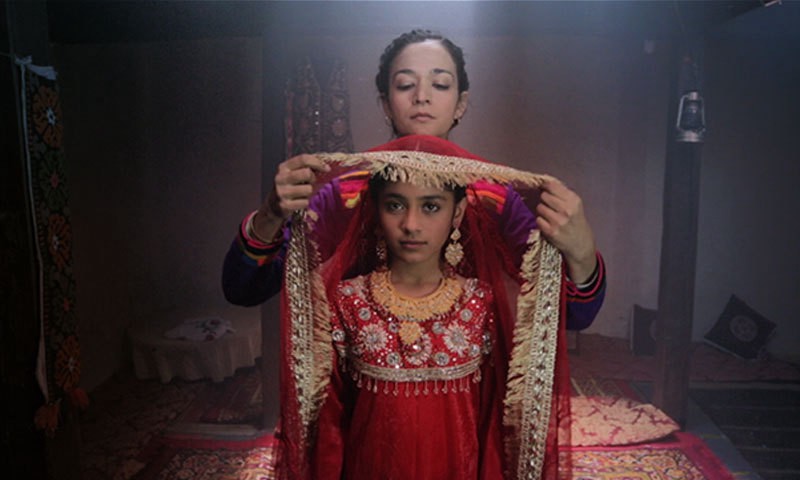Afia Nathaniel was born in Quetta, Pakistan, grew up in Lahore, and is now based in Brooklyn, NY. She graduated from Columbia University’s Film Directing program. She directed the short films “Nadah” (2003), “Toba Tek Singh” (2005) and “Long After” (2006). Dukhtar (Daughter, 2014) is her debut feature. (TIFF official site)
Dukhtar will play at the Toronto International Film Festival on September 5, 6, and 13.
WaH: Please give us your description of the film playing.
AN: The film Dukhtar (Daughter) is a story of a mother on the run with her ten-year-old daughter to save her from a child marriage. They are hunted down by her family and the bridegroom’s henchmen.
WaH: What drew you to this story?
AN: In 1999, I heard a story which refused to leave me. It was the story of young mother in Pakistan who kidnapped her daughters, ran away from her husband, and was pursued relentlessly by her family. Her journey of escape was a harrowing tale spread over several years. What remained in my mind was the vision of this one woman and her extraordinary courage. I come from a family of very strong women, women who have endured very tough lives in hopes of a better one for their children.
I couldn’t shake this story off my mind, so I started penning a fictional screenplay while studying Film Directing at Columbia University. The writer in me found a way to connect with home. And the wanderer in me crafted the character of Allah Rakhi so I could give her the freedom to find a new life with her daughter.
WaH: What was the biggest challenge in making the film?
AN: It took me ten years to find the financing for the film. The biggest challenge was that my film had two female lead characters, and I’m a first time female filmmaker from Pakistan. In Pakistan itself, what this means is that if your feature film does not have women dancing in it or gyrating on the screen with hardly any clothes on, then no one is going to finance the film. There is no “item number” song in it, so to speak — nothing to cater to the male fantasy. Pakistani feature films are all about catering to the male ego and male fantasy.
Outside of Pakistan, the problem with finding financing was that the film was going to be shot entirely in Pakistan. It’s a road-trip film, and to make this authentically as a low budget film, you have to shoot on location in Pakistan. However, because Pakistan is considered too risky by investors, I went from one pitching table to another for several years.
WaH: What do you want people to think about when they are leaving the theatre?
AN: About their emotional connection to the story.
WaH: What advice do you have for other female directors?
AN: Don’t shy away from producing your own film and being in charge of its business end as well.
WaH: What’s the biggest misconception about you and your work?
AN: Men, especially male filmmakers, in Pakistan tell me how easy it must be for me to find money because I’m a female filmmaker telling a “feminist” story. And they don’t mean “feminist” as a compliment.
WaH: How did you get your film funded?
AN: We were very fortunate to be supported by several nonprofits and organizations in the early stages of development: Cinereach, Hubert Bals Fund, and a seed grant from National Geographic. Then, for many years nothing happened because there was no money to be found to shoot the film. After five years passed, I took the rights back to my film and in 2012 applied to SORFUND, a newly created Norwegian fund for films being shot in developing countries.
Meanwhile, I called my long-time line producer in Pakistan, Khalid, and told him I was beginning from scratch. I had nothing in my hand to make the film, and he said, “Just get to Karachi and we’ll figure it out.” So literally the day I was about to board the plane for Pakistan, I got two pieces of news simultaneously — that I had development money for the film from WorldView CBA and that we had won the production grant from Norway!
With these pieces of good news, I landed in Karachi and we immediately set about doing our research and costing the production down to the last detail. I set up a company and we took out a loan, and in a matter of few weeks in October 2012, we were in full pre-production mode on the film.
Name your favorite women directed film and why.
AN: I love The Piano by Jane Campion. It’s a beautiful, evocative, haunting film with memorable characters. There is a great sensitivity in how the emotional bonds are explored in the film. And the visualization is stunning — just unforgettable.







